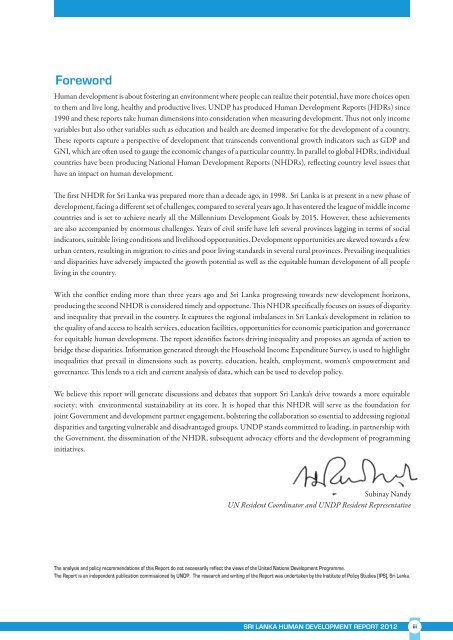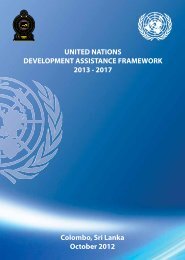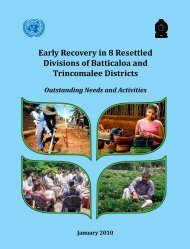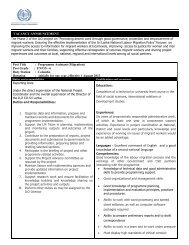Sri Lanka Human Development Report 2012.pdf
Sri Lanka Human Development Report 2012.pdf
Sri Lanka Human Development Report 2012.pdf
Create successful ePaper yourself
Turn your PDF publications into a flip-book with our unique Google optimized e-Paper software.
Foreword<br />
<strong>Human</strong> development is about fostering an environment where people can realize their potential, have more choices open<br />
to them and live long, healthy and productive lives. UNDP has produced <strong>Human</strong> <strong>Development</strong> <strong>Report</strong>s (HDRs) since<br />
1990 and these reports take human dimensions into consideration when measuring development. Thus not only income<br />
variables but also other variables such as education and health are deemed imperative for the development of a country.<br />
These reports capture a perspective of development that transcends conventional growth indicators such as GDP and<br />
GNI, which are often used to gauge the economic changes of a particular country. In parallel to global HDRs, individual<br />
countries have been producing National <strong>Human</strong> <strong>Development</strong> <strong>Report</strong>s (NHDRs), reflecting country level issues that<br />
have an impact on human development.<br />
The first NHDR for <strong>Sri</strong> <strong>Lanka</strong> was prepared more than a decade ago, in 1998. <strong>Sri</strong> <strong>Lanka</strong> is at present in a new phase of<br />
development, facing a different set of challenges, compared to several years ago. It has entered the league of middle income<br />
countries and is set to achieve nearly all the Millennium <strong>Development</strong> Goals by 2015. However, these achievements<br />
are also accompanied by enormous challenges. Years of civil strife have left several provinces lagging in terms of social<br />
indicators, suitable living conditions and livelihood opportunities. <strong>Development</strong> opportunities are skewed towards a few<br />
urban centers, resulting in migration to cities and poor living standards in several rural provinces. Prevailing inequalities<br />
and disparities have adversely impacted the growth potential as well as the equitable human development of all people<br />
living in the country.<br />
With the conflict ending more than three years ago and <strong>Sri</strong> <strong>Lanka</strong> progressing towards new development horizons,<br />
producing the second NHDR is considered timely and opportune. This NHDR specifically focuses on issues of disparity<br />
and inequality that prevail in the country. It captures the regional imbalances in <strong>Sri</strong> <strong>Lanka</strong>’s development in relation to<br />
the quality of and access to health services, education facilities, opportunities for economic participation and governance<br />
for equitable human development. The report identifies factors driving inequality and proposes an agenda of action to<br />
bridge these disparities. Information generated through the Household Income Expenditure Survey, is used to highlight<br />
inequalities that prevail in dimensions such as poverty, education, health, employment, women’s empowerment and<br />
governance. This lends to a rich and current analysis of data, which can be used to develop policy.<br />
We believe this report will generate discussions and debates that support <strong>Sri</strong> <strong>Lanka</strong>’s drive towards a more equitable<br />
society; with environmental sustainability at its core. It is hoped that this NHDR will serve as the foundation for<br />
joint Government and development partner engagement, bolstering the collaboration so essential to addressing regional<br />
disparities and targeting vulnerable and disadvantaged groups. UNDP stands committed to leading, in partnership with<br />
the Government, the dissemination of the NHDR, subsequent advocacy efforts and the development of programming<br />
initiatives.<br />
Subinay Nandy<br />
UN Resident Coordinator and UNDP Resident Representative<br />
The analysis and policy recommendations of this <strong>Report</strong> do not necessarily reflect the views of the United Nations <strong>Development</strong> Programme.<br />
The <strong>Report</strong> is an independent publication commissioned by UNDP. The research and writing of the <strong>Report</strong> was undertaken by the Institute of Policy Studies (IPS), <strong>Sri</strong> <strong>Lanka</strong>.<br />
sri lanka <strong>Human</strong> <strong>Development</strong> report 2012<br />
iii






